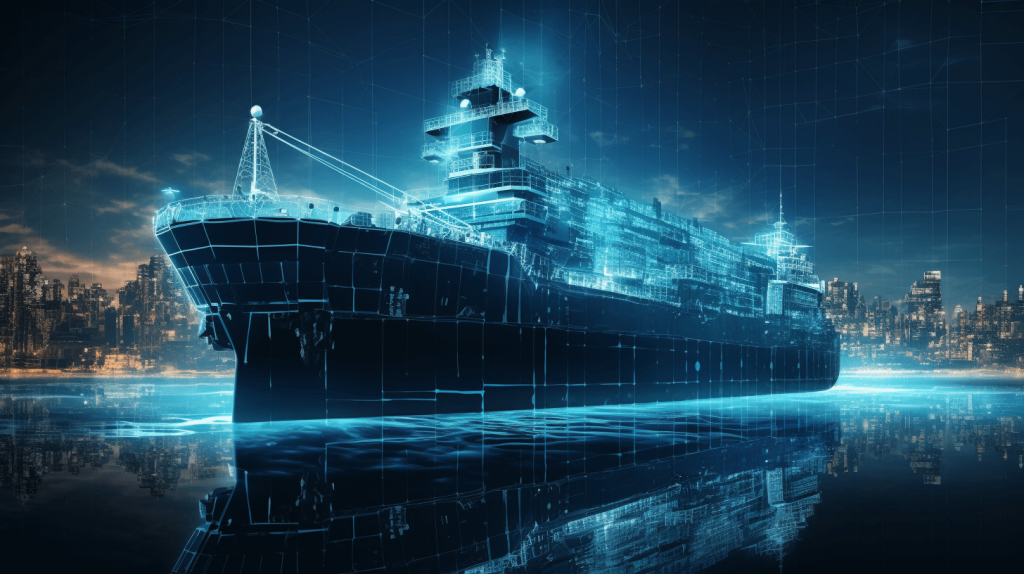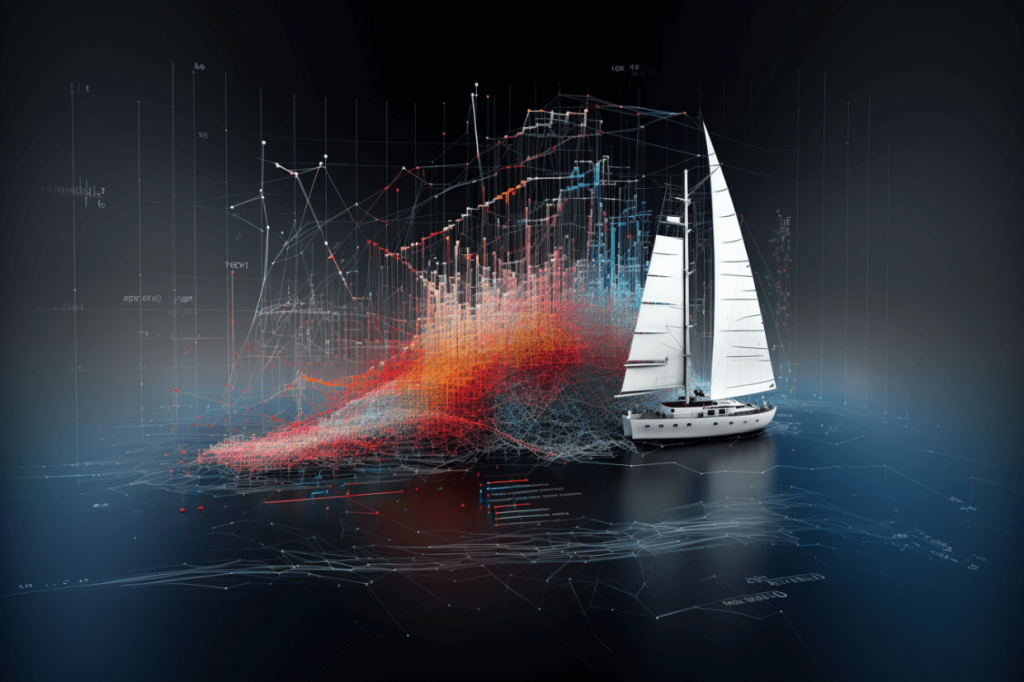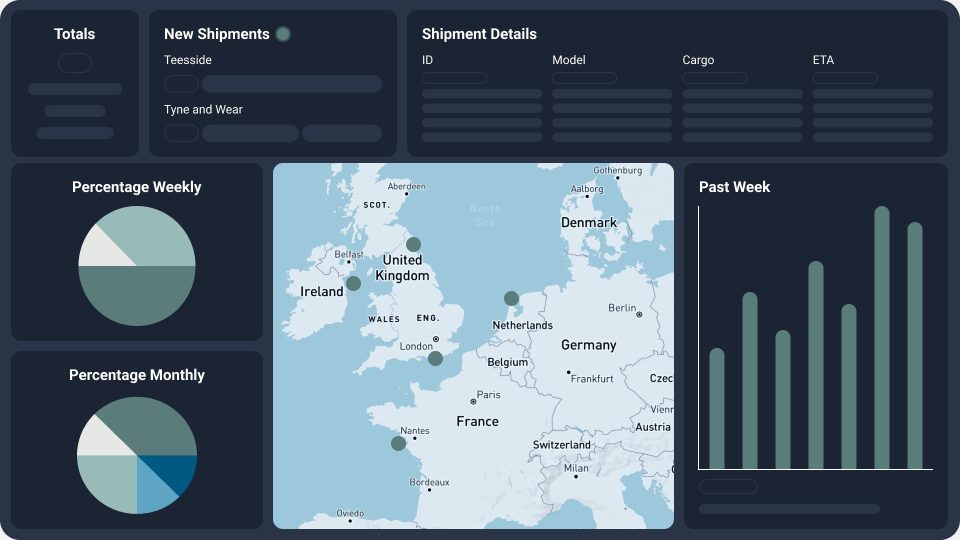Join our Mailing List to hear more!
Join the mailing list to hear updates about the world or data science and exciting projects we are working on in machine learning, net zero and beyond.

Embarking on a journey across the boundless oceans, the maritime industry stands as a colossal pillar, supporting over 80% of global trade and forging connections between continents. In this vast expanse of endless horizons and unfathomable depths, the concept of maritime intelligence emerges not merely as a tool but as an indispensable compass, guiding vessels through the intricate tapestry of global shipping lanes.
It is within this complex web of navigational routes, operational challenges, and security threats that maritime intelligence finds its crucial role, ensuring that the arteries of global commerce remain robust, secure, and fluid.
At SeerBI, we immerse ourselves into this oceanic world, providing a beacon of data-driven insights and solutions, meticulously designed to navigate through the myriad of challenges and uncertainties that the maritime industry encounters. Our journey through this article will explore the depths of maritime intelligence, unraveling its significance, delving into its multifaceted components, and showcasing how, at SeerBI, we harness the power of data to steer your maritime operations towards uncharted territories of efficiency, security, and profitability.

Understanding Maritime Intelligence
In the boundless expanse of the world’s oceans, where vessels traverse through tranquil and tumultuous waters alike, maritime intelligence stands as the pivotal force that ensures a safe, secure, and efficient journey from one port to another. It is an intricate web of information, analytics, and applications that safeguard and optimize maritime operations, playing a crucial role in the global shipping and trade industry.
Defining Maritime Intelligence
Maritime intelligence is the systematic process of collecting, analyzing, and applying information related to the maritime environment and activities. It encompasses various facets, including navigational intelligence, operational intelligence, security intelligence, and environmental intelligence, each playing a distinct role in enhancing the safety and efficiency of maritime operations.
Navigational Intelligence: This involves the collection and analysis of data related to sea routes, weather conditions, and obstacles, ensuring vessels navigate safely and efficiently through the waters. It helps in optimizing routes, avoiding hazardous areas, and ensuring timely arrivals and departures.
Operational Intelligence: Focused on the internal operations of a vessel or a fleet, operational intelligence involves managing resources, optimizing routes, ensuring compliance with international maritime laws, and enhancing overall operational efficiency.
Security Intelligence: This facet is concerned with safeguarding vessels, cargo, and crew from various threats, such as piracy, terrorism, and cyber-attacks. Security intelligence involves assessing threats, implementing security protocols, and ensuring the physical and digital security of maritime operations.
Environmental Intelligence: With a keen eye on sustainability and protecting marine ecosystems, environmental intelligence involves monitoring, managing, and mitigating the environmental impact of maritime activities. It ensures compliance with environmental regulations and contributes towards sustainable maritime operations.
The Significance of Maritime Intelligence
The global maritime industry is a colossal network of vessels, routes, ports, and operations, with each element interwoven intricately with the others. Maritime intelligence is vital in:
Ensuring Safety: By providing insights into potential hazards, whether they be stormy weather, unstable routes, or potential security threats, maritime intelligence safeguards vessels and crews from various perils.
Optimizing Operations: Through data-driven decision-making, maritime intelligence helps in optimizing routes, managing resources efficiently, and enhancing the overall performance of maritime operations.
Mitigating Risks: By identifying and evaluating potential threats and challenges, maritime intelligence allows for the implementation of strategies to mitigate risks and safeguard operations.
Compliance and Sustainability: Ensuring that maritime operations comply with international laws, regulations, and sustainability standards by providing the necessary data and insights to navigate through legal and environmental considerations.
The Interplay of Data and Technology
In the digital age, maritime intelligence is heavily reliant on the interplay of data and technology. Various technologies, such as satellite communication, AIS, radar systems, and cybersecurity tools, facilitate the collection, transmission, and protection of data. This data, when analyzed through sophisticated algorithms and analytics, transforms into actionable intelligence, guiding decision-makers in navigating through the multifaceted challenges posed by the maritime environment.
In essence, maritime intelligence is not merely a repository of data but a dynamic, evolving entity that adapts and responds to the ever-changing maritime landscape. It is the compass that guides vessels through the myriad of challenges and uncertainties posed by the vast oceans, ensuring that every journey is undertaken with the utmost safety, efficiency, and sustainability in mind.

The Pillars of Maritime Intelligence
Navigating through the vast and often unpredictable waters of the world, maritime intelligence stands as the compass guiding vessels safely and efficiently from port to port. It is not merely a tool but a structured framework that ensures the seamless operation of maritime activities. Let’s delve into the crucial pillars that uphold the structure of maritime intelligence:
In the maritime domain, accurate and timely data is paramount. The initial pillar, data collection, involves gathering information from a myriad of sources to create a comprehensive and actionable data pool. This includes:
Satellite Data: Utilizing satellite technology to obtain real-time data on ship locations, weather conditions, and potential obstacles.
AIS (Automatic Identification System): Employing AIS to gather data on ship identity, position, course, and speed, facilitating enhanced tracking and monitoring.
Weather Systems: Integrating meteorological data to anticipate weather conditions and navigate optimally.
Port Data: Collecting information related to port schedules, capacities, and restrictions to optimize docking and cargo operations.
Once data is collected, the second pillar, data analysis, comes into play. This involves:
Pattern Recognition: Utilizing algorithms to identify patterns and trends within the data, such as optimal routes and common disruptions.
Predictive Analytics: Employing predictive models to anticipate future scenarios, such as potential delays due to weather or geopolitical events.
Strategic Planning: Leveraging data insights to formulate strategic plans, ensuring efficient and cost-effective maritime operations.
The third pillar, threat assessment, is crucial in identifying and evaluating potential risks in maritime operations. This encompasses:
Piracy Threats: Analyzing data to identify and avoid piracy-prone areas, ensuring the safety of the vessel and its crew.
Environmental Risks: Evaluating environmental data to mitigate risks related to weather, sea conditions, and other natural phenomena.
Geopolitical Risks: Assessing the geopolitical landscape to navigate away from conflict zones or areas with potential for unrest.
The final pillar, decision-making, involves implementing the intelligence derived from the previous pillars to make informed and strategic decisions. This includes:
Route Optimization: Utilizing data insights to select the most efficient and safe routes, ensuring timely deliveries while minimizing fuel consumption.
Risk Mitigation: Implementing strategies to mitigate identified threats, ensuring the safety and security of maritime operations.
Operational Decisions: Making informed choices regarding speed, course alterations, and port activities to optimize operations and adhere to schedules.
In essence, these pillars of maritime intelligence work in tandem to navigate through the complex and dynamic maritime environment. By meticulously collecting data, analyzing it for actionable insights, assessing potential threats, and making informed decisions, maritime intelligence ensures that vessels traverse the oceans safely, efficiently, and effectively.
In the next section, we will explore the challenges faced by the maritime industry in implementing intelligence and how technological advancements are paving the way for enhanced maritime operations.

Challenges in Maritime Intelligence
Navigating the vast and often tumultuous waters of the world, the maritime industry encounters a sea of challenges that require adept maritime intelligence to manage effectively. The ocean, with its unpredictable nature and the intricate web of international waters, presents a unique set of obstacles that maritime professionals must navigate. Let’s delve into some of the predominant challenges faced by the industry in harnessing and implementing maritime intelligence.
Data Silos and Integration: The maritime industry is awash with data from various sources, such as AIS, radar, weather systems, and vessel specifications. However, the integration of this data into a unified, accessible, and actionable format remains a formidable challenge. Data silos, wherein information is isolated in disparate systems, hinder the ability to derive comprehensive insights and formulate coherent strategies.
Cybersecurity Threats: As the industry increasingly relies on digital technologies and IoT devices, it becomes a lucrative target for cyber-attacks. Ensuring the security and integrity of data, particularly when it pertains to sensitive navigational and operational information, is paramount. Cybersecurity threats pose not only a risk to data but also to the physical safety of vessels and crew, making this a critical challenge to address.
Environmental and Geopolitical Variability: The maritime industry must constantly adapt to the changing tides of environmental and geopolitical contexts. From navigating through the implications of climate change, such as altered weather patterns and sea levels, to steering through the complexities of international waters and geopolitical tensions, maritime intelligence must be dynamic and adaptable.
Regulatory Compliance: Ensuring adherence to a myriad of international, national, and local regulations is a complex task. Regulations pertaining to environmental conservation, vessel specifications, crew welfare, and cargo management are just a few areas where compliance must be meticulously managed and constantly updated in line with evolving laws and standards.
Real-time Decision Making: The ability to make informed, real-time decisions is crucial in the maritime industry, where conditions can change rapidly. Ensuring that maritime intelligence is not only accurate but also timely and actionable in real-time scenarios is a significant challenge, particularly in remote or harsh sea conditions.
Human Factor and Training: The implementation of maritime intelligence is also deeply intertwined with the human factor. Ensuring that maritime professionals are adequately trained and adept at utilizing intelligence tools and interpreting data is vital. Bridging the gap between technological advancements and human capability is essential to fully harness the potential of maritime intelligence.
Technology Adoption: Despite the clear advantages, the adoption of advanced technologies and intelligence solutions is not uniform across the maritime industry. Resistance to change, budget constraints, and a lack of awareness or expertise can hinder the widespread adoption of intelligent solutions, limiting the industry’s overall ability to enhance safety and efficiency.
Addressing these challenges necessitates a holistic approach that intertwines advanced technology, robust cybersecurity, regulatory adherence, and continuous training and development for maritime professionals. As we sail into the future, the role of comprehensive, integrated, and secure maritime intelligence will be pivotal in navigating through these challenges, ensuring that the maritime industry can weather any storm that comes its way.

SeerBI: Your Partner in Maritime Intelligence
Navigating the intricate waters of the maritime industry demands a steadfast ally, one that comprehends the depths and shallows of its unique challenges. SeerBI’s Maritime AI Lab emerges as that unwavering partner, anchoring your operations in a sea of data-driven intelligence and innovative solutions.
Embarking on a Voyage of Advanced Analytics
In the boundless ocean of data, SeerBI’s advanced analytics serve as your compass, pointing towards informed and strategic decision-making. Our sophisticated algorithms dive deep into data, extracting actionable insights that empower your maritime operations. From optimizing shipping routes to predicting logistical challenges, SeerBI ensures that your decisions are always anchored in robust data, steering you towards operational excellence.
Navigating Through Risks with Precision
The maritime domain is fraught with potential perils, from piracy threats to environmental hazards. SeerBI’s risk management solutions stand as your vigilant lookout, identifying, assessing, and mitigating risks with precision. Our tools are designed to safeguard your voyages against unforeseen challenges, ensuring that your cargo, crew, and vessels are always shielded from potential threats. With SeerBI, you navigate through calm waters, where risks are not just identified but strategically managed.
Sailing Towards Operational Efficiency
In the quest for operational efficiency, SeerBI’s intelligent solutions emerge as your sails, propelling your operations towards unparalleled efficacy. Our offerings are crafted to enhance every facet of your maritime endeavors, from logistics and supply chain management to vessel maintenance and crew management. By integrating SeerBI’s solutions, you ensure that your operations are not just streamlined but also adaptive to the ever-changing maritime landscape.
Anchoring Success with SeerBI
Our commitment at SeerBI extends beyond providing solutions. We forge partnerships, understanding the unique nuances of your operations with out Maritime AI Workshops, and tailoring our offerings to align with your strategic objectives. Our case studies reflect a tapestry of success stories, where maritime entities have not just navigated through challenges but have also anchored themselves in success, leveraging SeerBI’s maritime intelligence solutions.

In the boundless expanse of the maritime world, intelligence stands as the lighthouse, guiding vessels through the intricate web of operational, navigational, and security challenges. Maritime intelligence is not merely a tool but a compass, directing the industry towards safer, more efficient, and sustainable horizons.
SeerBI, with its innovative, data-driven solutions, emerges as a pivotal ally in this journey, ensuring that your maritime endeavors are not only safeguarded but also optimized for unparalleled success. Our advanced analytics, risk management strategies, and operational insights are meticulously crafted to navigate through the multifaceted challenges of the maritime domain.
Explore the depths of what SeerBI can offer to your maritime operations. Connect with us and discover a world where data and maritime intelligence converge to create a sea of opportunities, safeguarding and propelling your ventures across the global waters. Let’s sail towards a future of informed, secure, and efficient maritime operations, together.
Join the mailing list to hear updates about the world or data science and exciting projects we are working on in machine learning, net zero and beyond.
Fill in the form below and our team will be in touch regarding this service
07928510731
[email protected]
Victoria Road, Victoria House, TS13AP, Middlesbrough